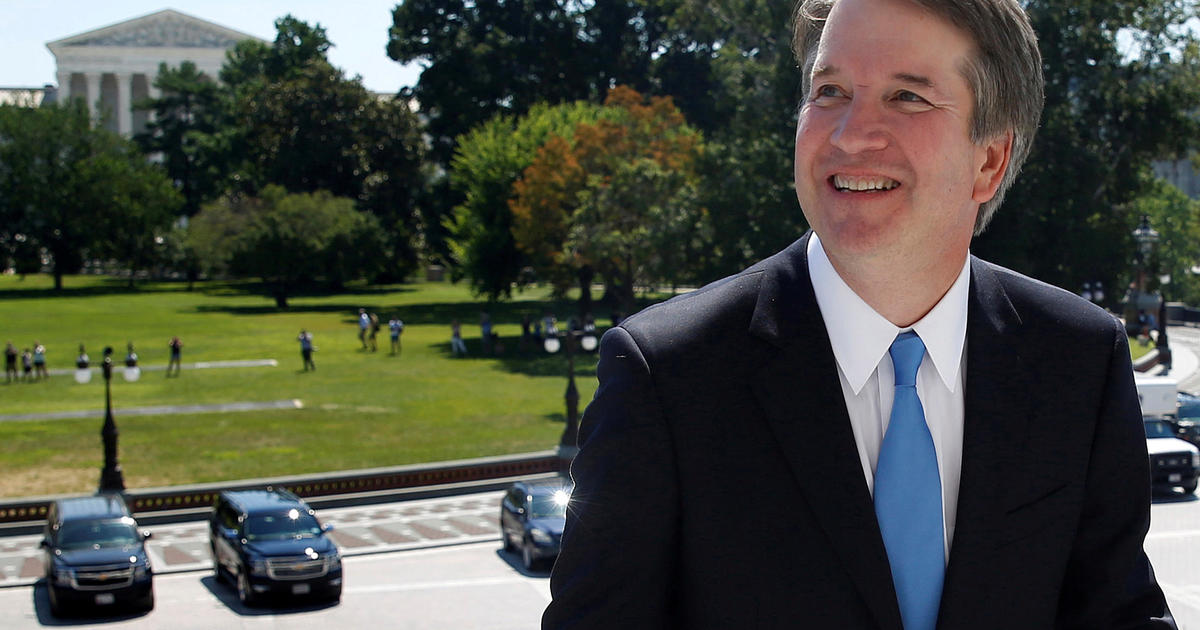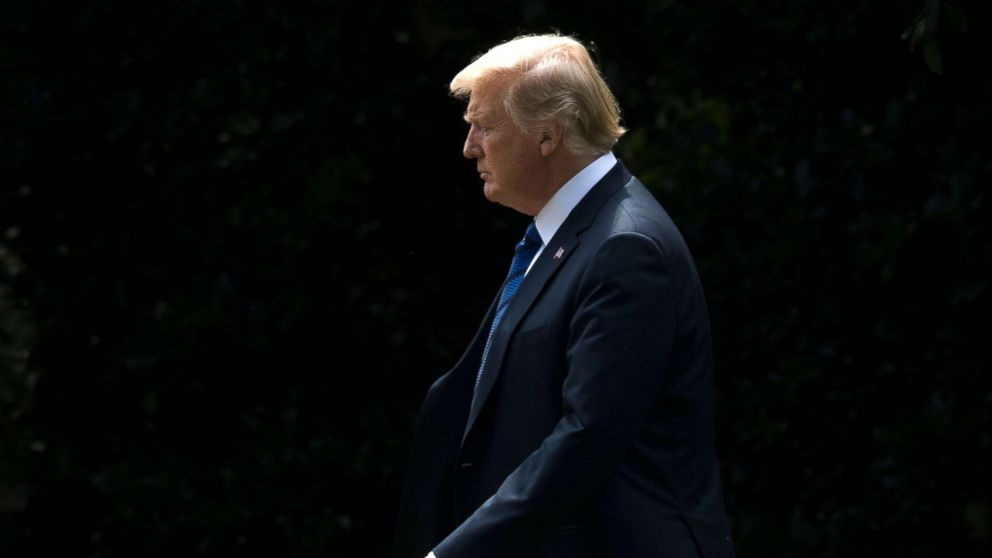
Over the course of the next decade or two, the Supreme Court will likely undertake some of the most consequential digital privacy cases that bear on the lives of millions of Americans and will reverberate everywhere — from cars to courtrooms — for generations to come. And Judge Brett Kavanaugh’s likely addition to the high court, along with President Trump’s first nominee, Justice Neil Gorsuch, will be deciding voices on where the court lands in those cases.
“I think the next decade of Fourth Amendment jurisprudence is going to be fascinating,” said Christopher Slobogin, a law professor at Vanderbilt University Law School and director of the school’s Criminal Justice Program.
“This is a watershed moment, because technology, police are using technology and eventually the court’s going to have to recognize that and respond to it,” Slobogin added.
More and more, the courts are going to have to decide where to draw the lines, as law enforcement looks to things like drones, facial recognition software and predictive policing — determining who might commit a crime before they do — through social media, Slobogin said. Those technologies raise new legal questions, Slobogin said, because most people don’t think of their social media communications as being public. Do police need a warrant before they access that kind of information? Slobogin posed.
Technology almost always outpaces laws — just watch one of the Facebook hearings Congress held earlier this year to see why laws created by those who don’t grasp technology are behind in legislating it. The courts, too, are playing catch-up, navigating the Fourth Amendment’s right of the people against unreasonable searches and seizures, and making probable cause the standard for a warrant, in a world in which technology is ever-expanding, ever-advancing, and ever-enhancing law enforcement’s capabilities.
Kavanaugh’s record when it comes to digital privacy and Fourth Amendment issues isn’t particularly extensive. But it’s extensive enough to stall GOP Kentucky Sen. Rand Paul‘s support, who has yet to announce whether he’ll vote yes on the president’s latest Supreme Court pick, and to incite the outright protest of Republican Rep. Justin Amash of Michigan, although as a member of the House he doesn’t play a role in the confirmation process. Paul, who met with Kavanaugh on Tuesday, told Politico earlier this week he has serious concerns about Kavanaugh’s record on the issue.
“I am honestly undecided,” he told Politico. “I am very concerned about his position on privacy and the Fourth Amendment. This is not a small deal for me. This is a big deal.”
“When Kavanaugh is on the Supreme Court, undermining our #4thAmendment right against unreasonable searches and seizures, it will be too late for others to join me,” Amash tweeted earlier this month.
Kavanaugh’s record does offer some insight where he might land on future cases in the years to come.
“My guess is he’d be like Alito,” Slobogin said, meaning Justice Samuel Alito, on issues of privacy and the Fourth Amendment. Alito has often sided with the government law enforcement in a number of cases about the constitutionality of police searches.
Perhaps Kavanaugh’s most famous decision related to digital privacy and the Fourth Amendment was a 2015 case about the NSA’s metadata collection program. That program, unearthed by the controversial NSA leaker Edward Snowden, let the NSA collect millions of call records without disclosure. Kavanaugh’s court, the U.S. Court of Appeals for the District of Columbia Circuit, threw out another judge’s ruling that would have stopped the NSA from collecting the records.
Kavanaugh, in a solo concurrence with the decision, declared the program was “entirely consistent with the Fourth Amendment.” He reached that conclusion partly by reasoning from what’s known as the third-party doctrine — judicial philosophy that asserts once people give up their information to a third party, like a private telephone company, they also surrender an expectation of privacy and the government can use it. The third-party doctrine Kavanaugh used, Slobogin said, is on “life support” in the digital age in which people give up vast amounts of information to companies on an almost daily basis and the Supreme Court begins to recognize that in its opinions.
But, even if the government’s collection of the phone data constituted a reasonable search, Kavanaugh, who was working in the Bush White House on Sept. 11, 2001, said it falls under a “special need” exception to the Fourth Amendment’s warrant requirement — the national security and the need to fight terrorism. Matthew Feeney, a policy analyst and director of emerging technologies at the libertarian Cato Institute, called Kavanaugh’s reasoning a “lawyer-y way of saying, ‘because 9/11,'” when the 9/11 Commission report Kavanaugh cites doesn’t even call for such a broad metadata collection program.
“My real concern is then the turn that the concurrence takes, which is to mention that the warrantless collection of millions of Americans data would not run afoul of the Fourth Amendment thanks to the special needs doctrine” said Feeney, who called Kavanaugh’s reasoning basically the “widest application” of the special needs doctrine he’s seen.
In another case, a stop-and-frisk case called United States v. Askew, Kavanaugh authored a 32-page dissent arguing that the police unzipping a person’s jacket — which in this case revealed a gun — constituted a lawful part of eyewitness identification. Kavanaugh argued that prohibiting police from “conducting identification procedures that constitute searches would lead to absurd and dangerous results.”
In 2010, Kavanaugh dissented from the D.C. court’s decision not to revisit a case that decided police violated a suspect’s Fourth Amendment rights by using a GPS tracker on him without a warrant. If anything, placing the GPS tracker may have violated the Fourth Amendment, but using it to track a person’s movements did not, Kavanaugh suggested. He based his reasoning on a 1983 case called States v. Knotts, which determined the government didn’t violate a person’s Fourth Amendment rights by using a radio transmitter to track his movements, because the decision determined a person “traveling in an automobile on public thoroughfares has no reasonable expectation of privacy in his movements from one place to another.”
The case Kavanaugh dissented on in 2010 would eventually reach the Supreme Court as United States v. Jones. The high court disagreed with Kavanaugh and ruled unanimously in 2012 that installing a GPS tracking device on a car and using it to monitor the vehicle’s movements constituted an unreasonable search under the Fourth Amendment. On the lower court, Kavanaugh had concluded that the individual’s Fourth Amendment rights had not been violated.
Another recent landmark case in the Supreme Court was Carpenter v. United States, in which the Supreme Court ruled 5-4 earlier this year that the government had conducted an unconstitutional search by failing to obtain a warrant based on probable cause before using a suspect’s cell phone records to track his location and movement.
Still, it’s hard to predict how a Justice Kavanaugh would exercise jurisprudence differently than a Judge Kavanaugh, Slobogin points out. Circuit court judges rely heavily on precedent, as do Supreme Court justices, but Supreme Court justices have more latitude in their opinions.
Slobogin said Gorsuch, who wrote his own dissent in Carpenter questioning the third-party doctrine but dissenting nonetheless, is “a justice in the Scalia mold when it comes to the Fourth Amendment.”
“He is not happy at all with the expectation of privacy test,” Slobogin said, adding Gorsuch thinks such judicial philosophy is a “court-fabricated doctrine” not guaranteed by the Constitution.
Kavanaugh and Gorsuch could either expand on the Fourth Amendment protections spelled out in the, albeit narrow, Carpenter and Jones decisions, or stall progress on guaranteeing Fourth Amendment protections, Slobogin said.
“I think they’re crucial because if they sign on to the momentum that Jones and Carpenter have established, then we’re going to see significant change in Fourth Amendment doctrine,” Slobogin said. “If on the other hand they put the brakes on what we’ve seen. … If they’re hostile to what we’ve seen since 2012, then at best I think you’ll see very slow, incremental change.”
It’s quite possible, if not likely, that Kavanaugh will be reviewing cases involving technology most people haven’t dreamed of yet, Feeney said.
“There will be in the next couple of decades cases involving surveillance technology that we’re adapting to and getting used to now, but I’m sure there will be cases involving technologies that we’re not even thinking about,” Feeney said.

